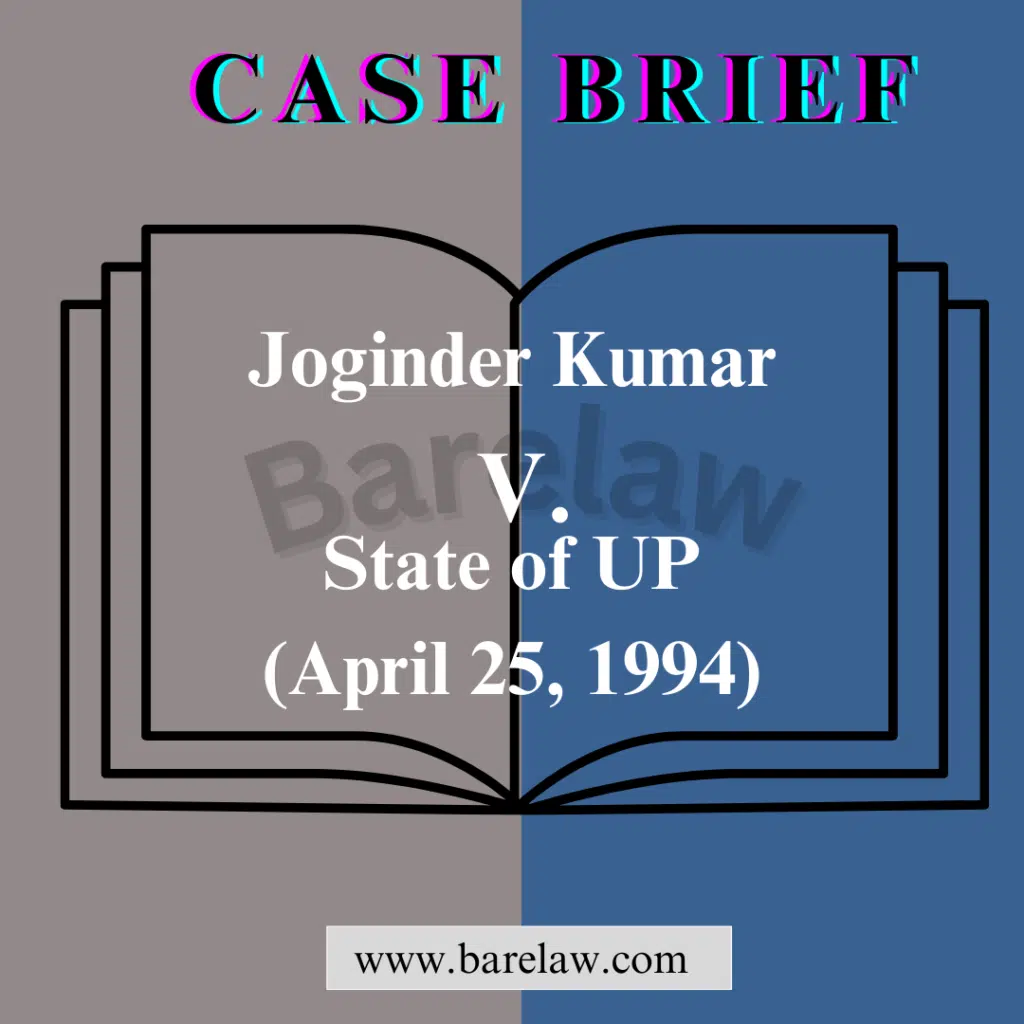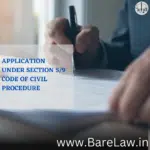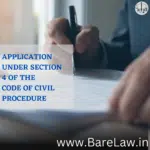
Table of Contents
Joginder Kumar vs State of UP
Date of Decision:
April 25, 1994
Facts:
The Joginder Kumar vs State of UP case involved the following facts:
- The petitioner, Joginder Kumar, was a 28-year-old advocate who had been summoned by the Senior Superintendent of Police (SSP) of Ghaziabad for inquiries in a case.
- On January 7, 1994, Joginder Kumar appeared personally at the SSP’s office along with his brothers, Shri Mangeram Choudhary, Nahar Singh Yadav, Harinder Singh Tewatia, and Amar Singh.
- Instead of being released after the inquiries, Joginder Kumar was kept in custody by the SSP.
- When Joginder Kumar’s brothers inquired about his release, they were misinformed and told that he would be freed in the evening after further inquiries.
- On January 8, 1994, Joginder Kumar was kept in jail for additional research in a case, and he was not brought before a magistrate.
- On the third day, Joginder Kumar’s brothers discovered that he had been taken to an undisclosed location.
- A habeas corpus petition was filed to challenge Joginder Kumar’s detention
These facts formed the basis of the case and raised important questions about the rights of individuals during arrest and the limits of police power. The Supreme Court of India, in its decision, laid down guidelines for arrest to ensure that arrests are made in accordance with the law and to protect the rights of individuals.
Issues:
In the Joginder Kumar vs State of UP case, several key issues were raised. These issues revolved around the rights of individuals during arrest and the limits of police power. The case highlighted the need for proper procedures to be followed during arrests and the protection of individual rights. Here are the main issues in the case:
- Unlawful Detention: The primary issue in the case was the unlawful detention of Joginder Kumar by the Senior Superintendent of Police (SSP) of Ghaziabad. Joginder Kumar was called for inquiries in a case but was kept in custody for five days without being presented before a magistrate.
- Violation of Fundamental Rights: The case raised concerns about the violation of fundamental rights guaranteed under the Indian Constitution. Joginder Kumar’s right to liberty and protection against arbitrary arrest and detention were at stake.
- Abuse of Police Power: The case highlighted the potential abuse of power by the police. Joginder Kumar’s detention without proper justification and without being produced before a magistrate raised questions about the exercise of police authority.
- Lack of Transparency: The undisclosed location where Joginder Kumar was taken on the third day of his detention raised concerns about transparency and accountability in the arrest process.
- Need for Guidelines: The case emphasized the need for clear guidelines to regulate the power of arrest and protect the rights of individuals. The Supreme Court of India, in its decision, laid down guidelines known as the “Joginder Kumar guidelines” to ensure that arrests are made in accordance with the law and to prevent the abuse of power by the police.
- Importance of Habeas Corpus: The filing of a habeas corpus petition in this case highlighted the significance of this legal remedy in safeguarding individual liberty and challenging unlawful detention.
The Joginder Kumar vs State of UP case brought attention to the issues surrounding arrests, police power, and the protection of individual rights. It led to the formulation of guidelines that have had a lasting impact on the criminal justice system in India. These guidelines serve as a reminder of the importance of upholding the rights of individuals and ensuring that arrests are carried out in a fair and lawful manner.
Holding:
The holdings in the Joginder Kumar vs State of UP case are as follows:
- Unlawful detention is a violation of an individual’s fundamental rights: The Supreme Court of India held that the unlawful detention of Joginder Kumar by the Senior Superintendent of Police (SSP) of Ghaziabad was a violation of his fundamental rights guaranteed under the Indian Constitution.
- Guidelines for arrest are necessary: The Court emphasized the need for clear guidelines to regulate the power of arrest and protect the rights of individuals. The Court laid down guidelines known as the “Joginder Kumar guidelines” to ensure that arrests are made in accordance with the law and to prevent the abuse of power by the police.
- Arrests must be made in accordance with the law: The Court held that arrests must be made in accordance with the law and that the police must have a valid reason for arresting an individual. The police must also inform the individual of the grounds for arrest and the right to legal representation.
- Arrests must be made transparently: The Court emphasized the need for transparency in the arrest process. The police must inform the individual’s family or friends of the arrest and the place of detention. The police must also maintain a record of the arrest and inform the individual of the right to inform someone of their arrest.
- Habeas corpus is an important legal remedy: The filing of a habeas corpus petition in this case highlighted the significance of this legal remedy in safeguarding individual liberty and challenging unlawful detention.
The holdings in the Joginder Kumar vs State of UP case emphasized the importance of upholding the rights of individuals during arrest and detention. The Court laid down guidelines to ensure that arrests are made in accordance with the law and to prevent the abuse of power by the police. The case serves as a reminder of the need for transparency and accountability in the arrest process and the significance of legal remedies such as habeas corpus in protecting individual liberty.
Disposition:
The disposition in the Joginder Kumar vs State of UP case was that the Supreme Court of India held that the unlawful detention of Joginder Kumar by the Senior Superintendent of Police (SSP) of Ghaziabad was a violation of his fundamental rights guaranteed under the Indian Constitution.
The Court emphasized the need for clear guidelines to regulate the power of arrest and protect the rights of individuals. The Court laid down guidelines known as the “Joginder Kumar guidelines” to ensure that arrests are made in accordance with the law and to prevent the abuse of power by the police.
The Court held that arrests must be made in accordance with the law and that the police must have a valid reason for arresting an individual. The police must also inform the individual of the grounds for arrest and the right to legal representation. The Court emphasized the need for transparency in the arrest process.
The police must inform the individual’s family or friends of the arrest and the place of detention. The police must also maintain a record of the arrest and inform the individual of the right to inform someone of their arrest. The Court also highlighted the significance of the legal remedy of habeas corpus in safeguarding individual liberty and challenging unlawful detention. The filing of a habeas corpus petition in this case served as a reminder of the importance of transparency and accountability in the arrest process.
The Joginder Kumar vs State of UP case has had a lasting impact on the criminal justice system in India. The guidelines laid down by the Court have been instrumental in ensuring that arrests are made in accordance with the law and that the rights of individuals are protected. The case serves as a reminder of the need for transparency and accountability in the arrest process and the significance of legal remedies such as habeas corpus in protecting individual liberty.
Summary:
The Joginder Kumar vs State of UP case involved the unlawful detention of Joginder Kumar by the Senior Superintendent of Police (SSP) of Ghaziabad. The case raised several important issues regarding individual rights during arrest and the limits of police power. The Supreme Court of India, in its disposition, addressed these issues and laid down guidelines known as the “Joginder Kumar guidelines” to ensure that arrests are made in accordance with the law and to protect the rights of individuals.
The Court held that the unlawful detention of Joginder Kumar was a violation of his fundamental rights guaranteed under the Indian Constitution. The Court emphasized the need for clear guidelines to regulate the power of arrest and prevent the abuse of power by the police. The guidelines laid down by the Court are aimed at ensuring that arrests are made in accordance with the law and that the rights of individuals are protected. Some of the key issues raised in the case include:
- Unlawful Detention: The case highlighted the issue of unlawful detention, where Joginder Kumar was kept in custody by the SSP without being presented before a magistrate. This raised concerns about the violation of an individual’s right to liberty and protection against arbitrary arrest and detention.
- Violation of Fundamental Rights: The case emphasized the importance of protecting an individual’s fundamental rights, such as the right to liberty and protection against arbitrary arrest and detention. The Court held that the unlawful detention of Joginder Kumar was a violation of these rights.
- Abuse of Police Power: The case raised concerns about the potential abuse of power by the police. The unlawful detention of Joginder Kumar without proper justification and without being produced before a magistrate highlighted the need for accountability and transparency in the exercise of police authority.
- Need for Guidelines: The Court recognized the need for clear guidelines to regulate the power of arrest and protect the rights of individuals. The Joginder Kumar guidelines were formulated to ensure that arrests are made in accordance with the law and to prevent the abuse of power by the police.
- Importance of Habeas Corpus: The filing of a habeas corpus petition in this case highlighted the significance of this legal remedy in safeguarding individual liberty and challenging unlawful detention. It served as a reminder of the importance of transparency and accountability in the arrest process.
The Joginder Kumar vs State of UP case established the unlawfulness of Joginder Kumar’s detention and laid down guidelines to protect the rights of individuals during arrest. The case serves as a landmark decision that has had a lasting impact on the criminal justice system in India. It emphasizes the importance of upholding individual rights, ensuring transparency and accountability in the arrest process, and providing legal remedies to challenge unlawful detention.



